Social Welfare
Poshan Maah
Building a Healthier, Stronger Nation Through Nutrition
Posted On: 18 SEP 2025 5:54PM
Key Takeaways
- Prime Minister Narendra Modi launched the 8th Rashtriya Poshan Maah on September 17, 2025, along with the Swasth Nari Sashakt Parivar Abhiyan, aligning strongly with his vision of Sashakt Nari and Suposhit Bharat.
- As on September 17, 2025, there are 14,02,248 Anganwadi Centres and 9,14,75,640 eligible beneficiaries registered with the Poshan Tracker App.
- The PM POSHAN Scheme received a total financial outlay of ₹1,30,794.90 crore for the period 2021-22 to 2025-26.
- The National Family Health Survey (NFHS-5, 2019-21) reports reduced stunting among children under five from 38.4% to 35.5%.
- As per NFHS-5 report, underweight prevalence in children dropped from 35.8% to 32.1%.
Introduction
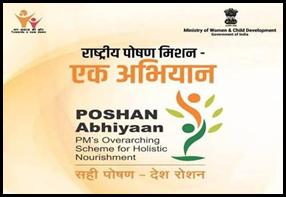
Launched on March 8, 2018, by Prime Minister Narendra Modi in Jhunjhunu, Rajasthan, Poshan Abhiyaan is a flagship multi-ministerial convergence mission designed to place nutrition at the forefront of India’s National Development Agenda. The initiative, officially named Prime Minister's Overarching Scheme for Holistic Nourishment (POSHAN), embodies PM Modi’s vision of linking nutrition to holistic development, emphasizing its role in building a healthier, stronger nation. Targeting children under six years, adolescent girls, pregnant women, and lactating mothers, the program addresses malnutrition through a technology-driven, community-centric approach.
In order to foster widespread awareness, Poshan Maah, celebrated annually during the month of September, coincides with PM Modi’s birthday month, reflecting his personal commitment to nutrition as a cornerstone of national progress. During Poshan Maah, the Prime Minister actively encourages citizens to share locally nutritious recipes via platforms like MyGov and the hashtag #Local4Poshan, promoting traditional, nutrient-rich diets to enhance community participation and dietary diversity.
The 8th Rashtriya Poshan Maah has been launched along with the Swasth Nari Sashakt Parivar Abhiyan (SNSPA) by PM Modi on his 75th birthday, aligning with his vision of Sashakt Nari and Suposhit Bharat .
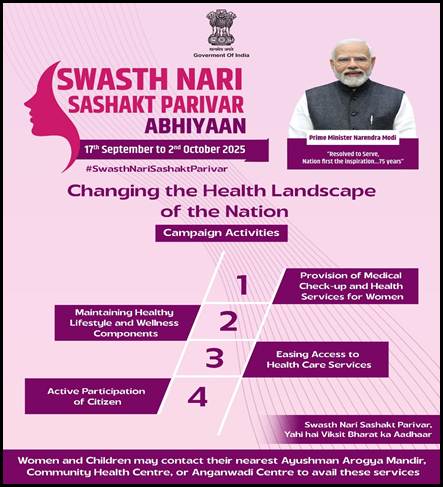
Objectives
The primary objectives of the POSHAN Abhiyan include:
- Preventing and reducing stunting, undernutrition, and low birth weight in children aged 0–6 years;
- Reducing anaemia prevalence among children (6–59 months), adolescent girls, and women (15–49 years).
According to the National Family Health Survey (NFHS-5, 2019-21), stunting among children under five decreased from 38.4% to 35.5%, underweight prevalence dropped from 35.8% to 32.1%, and wasting reduced from 21.0% to 19.3%.
15.4 crore children/adolescents received Iron and Folic Acid supplements in Q2 FY 2024-25.
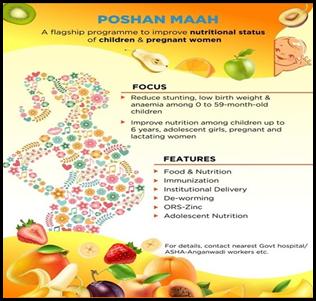
By prioritising the first 1,000 days from conception to age two, Poshan Abhiyaan seeks to break the intergenerational cycle of malnutrition, which is exacerbated by factors like poverty, early marriage, and gender discrimination.
To achieve these goals, Poshan Abhiyaan promotes dietary diversity, complementary feeding, and exclusive breastfeeding while fostering community engagement through the Jan Andolan strategy. The initiative integrates schemes like the Integrated Child Development Services (ICDS), National Health Mission, and Swachh Bharat Mission to ensure holistic nutrition delivery. Technology plays a pivotal role through tools like the Poshan Tracker app, launched in March 2021, which enables real-time monitoring of growth metrics and service delivery by Anganwadi workers.
Community-based events, such as Poshan Maah and Poshan Pakhwada held in March/April, engage millions through activities like nutrition workshops, rallies, and Poshan Vatika (nutri-gardens) to promote locally grown, nutrient-rich foods.
Key Themes and Focus
The 8th Rashtriya Poshan Maah continues to drive the Jan Andolan for promoting nutrition literacy and healthy practices. This year’s edition highlights innovative and inclusive approaches to address malnutrition and promote sustainable health. The key themes are:
- Addressing Obesity – Reducing Sugar and Oil Consumption: It aims to create supportive environments to combat obesity and create awareness on consuming less oil and sugar to build a healthier India.
“Obesity is becoming a big problem for our country. In the coming years, every 3rd person will be a victim to it. We must save ourselves from obesity. Therefore, I would like to give you a small suggestion, use 10% less oil in cooking.”
PM Narendra Modi, August 15, 2025
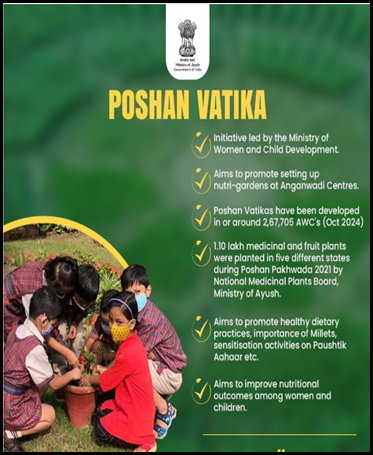
- Early Childhood Care and Education (ECCE)/Poshan Bhi Padhai Bhi (PBPB): Aligns with the National Education Policy 2020 to develop the world’s largest high-quality preschool network at Anganwadi Centres (AWCs), integrating nutrition with early education for holistic child development.
- EK Ped Maa Ke Naam: Integrates environmental sustainability with nutrition awareness, encouraging tree plantation and eco-friendly practices to support long-term health and well-being.
- Infant and Young Child Feeding (IYCF) Practices: Aims to enhance feeding practices for children under two years to improve nutrition outcomes, emphasising on optimal breastfeeding and complementary feeding.
“Children's nutrition is of topmost priority. While focus on their nutrition is throughout the year, there is one month when the entire country places special emphasis on it.”
Prime Minister Shri Narendra Modi
- Men’s Involvement in Nutrition and Caregiving: Promotes active male participation in nutrition awareness and caregiving roles to foster shared responsibility in family and community health.
POSHAN Tracker App: Digitising Nutrition
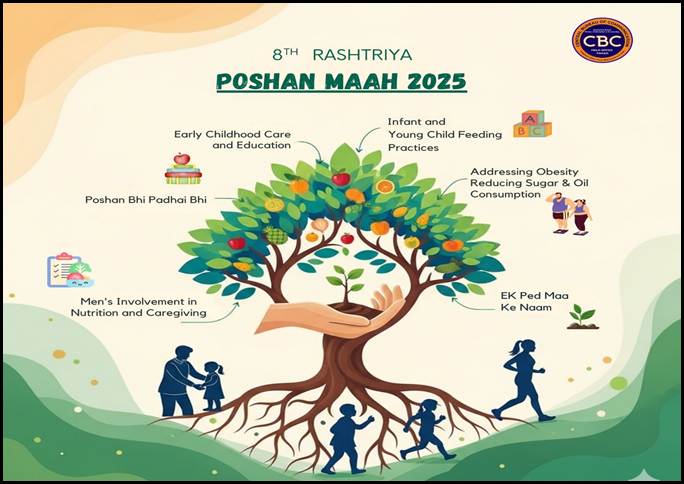
Launched on March 1, 2021, by the Ministry of Women and Child Development, the Poshan Tracker is a mobile application designed to enhance nutrition service delivery under the POSHAN Abhiyaan. It enables real-time identification and monitoring of stunting, wasting, and underweight prevalence among children, while supporting Anganwadi workers with efficient service delivery tools and performance tracking. The app provides critical, beneficiary-focused services and promotes real-time data analytics for improved outcomes.
Currently, there are 14,02,248 Anganwadi Centres and 9,14,75,640 eligible beneficiaries registered with the application and the numbers are steadily growing each day.
PM POSHAN: A Key Scheme Under POSHAN
The Pradhan Mantri Poshan Shakti Nirman or PM POSHAN Scheme, a centrally sponsored initiative, is one of the foremost rights based Centrally Sponsored Schemes under the National Food Security Act, 2013 (NFSA). The program is designed to improve nutritional outcomes and boost school attendance among students.
Some of the key aspects of PM POSHAN include:
- The Cabinet Committee of Economic Affairs (CCEA) approved the continuation of the PM POSHAN (POshan SHAkti Nirman) Scheme for 2021-22 to 2025-26.
- Earlier known as the National Programme for Mid-Day Meal in Schools, popularly called the Mid-Day Meal Scheme.
- The scheme covers all students of Classes I–VIII in Government and Government-aided schools.
- The scheme benefits around 11.80 crore children studying in 11.20 lakh schools nationwide.
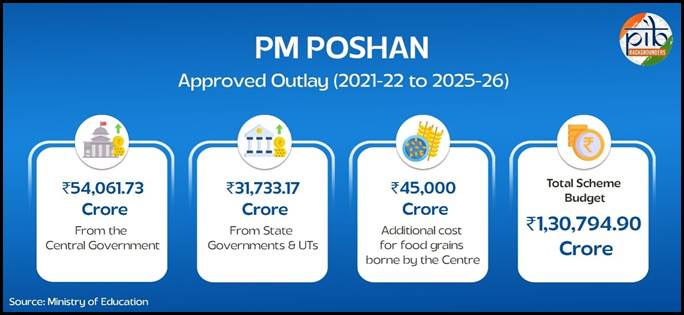
Through the PM POSHAN Scheme, funds allocated as ‘Material Cost’ are utilised to procure essential ingredients needed for preparing these meals[12].
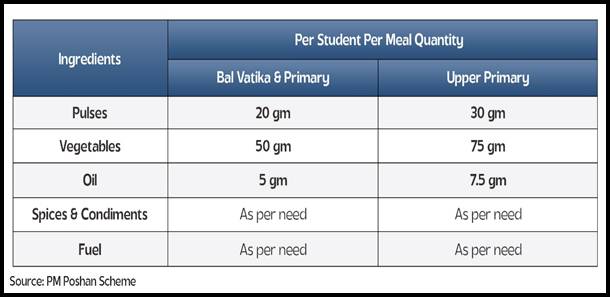
The Labour Bureau, which comes under the Ministry of Labour, collects monthly price data from 600 villages in 20 states to calculate inflation for the PM POSHAN basket, using the Consumer Price Index for Rural Labourers (CPI-RL). Based on this inflation index, the Ministry of Education, has increased the ‘Material Cost’ by 9.5%, effective May 1, 2025, across all states and Union Territories. This adjustment will result in an additional cost of approximately Rs 954 crore for the Central Government in the financial year 2025-26[13].

Further to the aforementioned, the PM POSHAN scheme also features the following[14]:
- Food Grains: Supplies 100g/child/day for primary and 150g/child/day for upper primary at NFSA rates (₹1/kg for coarse grains, ₹2/kg for wheat, ₹3/kg for rice).
- Cooking Cost: Covers ingredients (pulses, vegetables, oil, condiments, fuel) at ₹4.97/child/day for primary and ₹7.45/child/day for upper primary (effective April 1, 2020).
- Meals During Summer Vacations: Ensures meal provision in drought/disaster-affected areas to maintain nutrition continuity.
- Meals for Preparatory Classes: Extends meal provision to Balvatika (pre-class I) in primary schools, aligning with the National Education Policy under Samagra Shiksha.
Children Nutrition Park: Where Food Meets Fun
The Children Nutrition Park, inspired by Prime Minister Narendra Modi and located near the Statue of Unity in Ekta Nagar, Gujarat, is a unique theme park designed to educate children on healthy eating habits through the theme Sahi Poshan Desh Roshan.
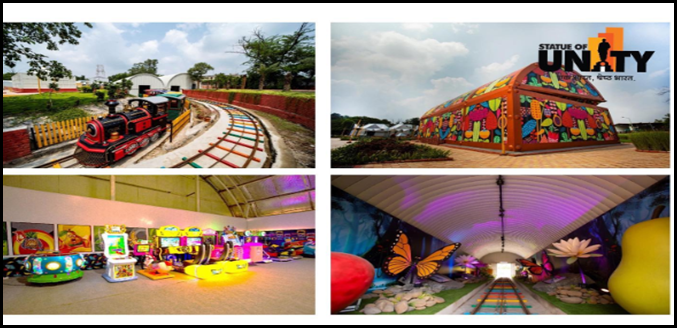
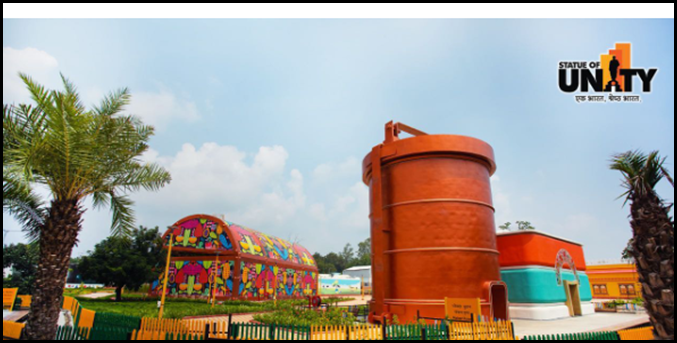
Featuring a 600-meter Nutri Train ride, the park offers interactive stations like Phalshaka Griham, where mascot Kisaan Kumar teaches about fruits and vegetables; PayoNagari, where Janardhan highlights milk products through games like "Feed the Cow"; Annapurna, promoting home-cooked food with digital games; Poshan Puram, focusing on nuts, seeds, and hydration; and Swastha Bharatam, emphasizing physical activity with yoga and sports games.
Additional attractions include a Mirror Maze with a 5D movie, Bhartiya Thaali, a Nutri Hunt Building with a jungle gym, and a Game Zone featuring Zorb Ball and cycling games. With state-of-the-art technology, accessibility for differently-abled children, and a Nutri Café serving healthy food, the park combines entertainment and education to promote holistic nutrition.
POSHAN PAKHWADA: Promoting Nutrition, Health, and Hygiene
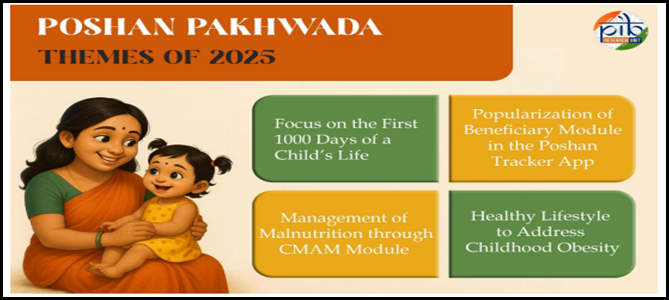
The Women and Child Development Ministry observes Poshan Pakhwada 2025 from April 8 to April 22, under Mission Poshan 2.0, to enhance nutrition awareness, improve health outcomes, and empower communities.
A key focus of this 7th edition was the first 1,000 days ofa child’s life—from conception to two years—highlighting the critical role of nutrition during this period in laying the foundation for lifelong health, development, and improved outcomes like enhanced productivity and higher earnings in adulthood, while strengthening community engagement and empowerment[15].
This year’s themes focussed on:
- Educating families on maternal nutrition
- Effective breastfeeding practices
- Importance of a balanced diet to combat childhood stunting and anaemia
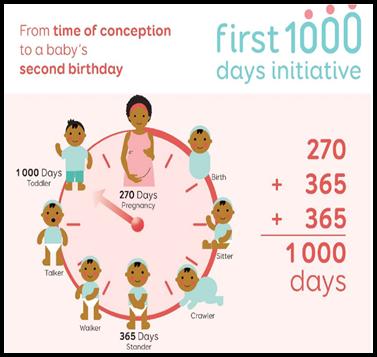
Additionally, it focused on promoting local solutions by encouraging the use of traditional, nutrient-rich foods, particularly in tribal areas, where indigenous diets play a significant role in improving health outcomes.
How to Participate in Poshan Maah
Poshan Maah is a nationwide initiative to promote nutrition and healthy living, and everyone can play a vital role in making it a success! Here are some meaningful ways you can get involved and contribute to a healthier India:
Educating Community
Organisation and participation in awareness campaigns in neighbourhoods, schools, or workplaces to highlight the importance of a balanced diet, breastfeeding, and combating malnutrition represent a key way in which community participation can be facilitated towards making Poshan Maah a successful event.
For instance, Poshan Maah 2024 included the distribution of nutri-baskets to pregnant and lactating mothers, as well as annaprashan or grain initiation ceremonies for infants. [16]
Plant Nutrition Gardens and Promote Kitchen Gardens
Participation in plantation drives to grow fruit trees, vegetables, or herbs in community spaces, schools, or backyards. These Poshan Vatikas help ensure access to fresh, nutritious produce. In line with this, during Poshan Maah 2022, more than 1.5 lakh events were reported on setting-up nutri-gardens or retro-fitting Poshan Vatikas with backyard poultry / fishery units was extensively carried out in a big way across the country.[17].
Supporting Anganwadi Centres and ASHA Workers
Individuals can actively contribute to Poshan Maah by volunteering at local Anganwadi centres, where they can assist in distributing nutritious meals, support health check-ups, or organise engaging activities for children and mothers.
For instance, during the closing ceremony of 7th Rashtriya Poshan Maah held in Ranchi in 2024, over 11,000 Saksham Anganwadi Centres across 20 states were virtually inaugurated.[18]. Furthermore, alongside Poshan Maah’s commitment, the Poshan Abhiyaan is advancing toward a Suposhit Bharat, with 13,99,484 operational Anganwadi Centres (AWCs) spanning 781 districts across 36 states and Union Territories, bolstered by the efforts of 13,33,561 Anganwadi workers[19].
Conclusion
The Poshan Maah initiative, a cornerstone of the Poshan Abhiyaan, has significantly advanced India’s fight against malnutrition by promoting dietary diversity, community engagement, and technology-driven solutions. Celebrated annually in September, Poshan Maah targets stunting, undernutrition, anaemia, and low birth weight, particularly in the first 1,000 days, through campaigns like #Local4Poshan. Supported by the PM POSHAN Scheme’s ₹1,30,794.90 crore budget (2021-26) and tools like the Poshan Tracker app, alongside innovative platforms like the Children Nutrition Park, Poshan Maah empowers communities and schools to foster sustainable nutritional practices for a healthier, stronger nation.
References:
Press Information Bureau:
https://www.pib.gov.in/PressReleasePage.aspx?PRID=1988614
https://www.pib.gov.in/PressReleasePage.aspx?PRID=2120666
https://static.pib.gov.in/WriteReadData/specificdocs/documents/2025/apr/doc202549536701.pdf
https://www.pib.gov.in/PressReleseDetailm.aspx?PRID=1861686
https://www.pib.gov.in/PressReleasePage.aspx?PRID=2060268
https://www.pib.gov.in/PressNoteDetails.aspx?NoteId=153204#:~:text=In%20addition%20to%20Poshan%20Maah's,by%2013%2C33%2C561%20Anganwadi%20workers
https://www.pib.gov.in/FactsheetDetails.aspx?Id=149254
Ministry of Women and Child Development:
https://www.india.gov.in/spotlight/poshan-abhiyaan-pms-overarching-scheme-holistic-nourishment
https://www.poshantracker.in/
Ministry of Education:
https://pmposhan.education.gov.in/
https://pmposhan.education.gov.in/Files/Food%20Grain%20Allocation/2025-26/Allocation%20of%20foodgrains%20PMPoshan_1st_2nd_qtr_2025-26SEL).pdf
https://dsel.education.gov.in/en/scheme/pm-poshan-scheme
Ministry of Electronics & Information Technology:
https://dic.gov.in/poshan-tracker/#main
Ministry of Health & Family Welfare:
https://www.mohfw.gov.in/?q=en/pressrelease/indias-fight-against-anemia
https://mohfw.gov.in/?q=hi/node/9284
Others:
https://www.newsonair.gov.in/poshan-pakhwada-2025-promoting-nutrition-awareness-and-empowerment/
https://ddnews.gov.in/en/poshan-pakhwada-2025-a-nationwide-celebration-of-nutrition-and-well-being/
https://balrakshabharat.org/rashtriya-poshan-maah/
https://ddnews.gov.in/en/seventh-rashtriya-poshan-maah-launched-with-a-focus-on-nutrition-and-well-being/
https://www.instagram.com/p/DODSAxnkxsy/
Click here to see in PDF
SK/RK
(Backgrounder ID: 155235)
Provide suggestions / comments